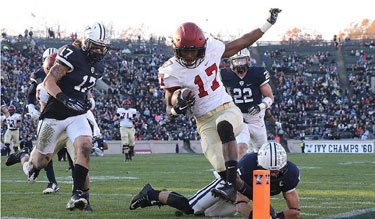“Today’s Yale Grads Aren’t Qualified to Lead in the 21st Century”
Demonstrations, Harvard-Yale Game, Millennials, Yale
Esteban Elizondo is only a senior at Yale, but he’s indignant enough to be an alumn.
Last weekend, 148 students stormed the field at the Harvard-Yale game to protest climate change, causing a 50-minute delay and forcing the players to finish in the dark. The Post editorial board called it “the college-version of a toddler’s meltdown,†and that is exactly right. As a current Yale student, I am constantly stunned by the childish behavior of my peers, who are voting-age adults attending what is supposedly one of the most prestigious colleges in America.
At Yale, there is seemingly a new protest every week. Each protest carries the same juvenile self-righteousness, enabled by a university administration that never dares to challenge its student body.
Yale “first-years†arrive on campus curious and mostly capable, but the university quickly proceeds to bubble-wrap their young minds, eliminating any trace of discomfort from their college experience. Rather than allowing students to learn through adversity, the administration creates a safe space where students are never told “no.†Instead, they’re provided with amenities ranging from therapy puppies to sandboxes — more fitting of a day-care center than a university.
Rather than confront its student body with uncomfortable truths, the university creates an alternate reality, where the only opinion that matters is yours, especially if you’re a leftist. Earlier this month, a group of students painted their faces white and began wailing outside a classroom as part of a protest against professor Emma Sky, whom they lazily branded a “war criminal†because she once served as an advisor to the commanding general of US forces in Iraq and the commander of NATO’s International Security Assistance Force in Afghanistan.
To be clear, professor Sky has dedicated her entire adult life to peace in the Middle East, and her calming influence during the war no doubt saved countless lives. But the students made no legitimate attempts to academically engage with her and claimed this was “interdisciplinary research†on the “ethnography of power.†Incredibly, this antic was part of a student’s senior project that was awarded both funding from a residential college and school credit.
The Harvard-Yale football protest, meanwhile, called for both schools to divest from fossil fuels, as though this could actually solve climate change, when the real answers are far more difficult and complicated. Apparently, America’s most academically successful students believe that conducting juvenile demonstrations is a more effective way to fix problems than proposing actual solutions.
But at Yale, there is little interest in challenging infantile thinking, because doing so would not advance the university’s objective: making sure students stay happy in school and get employed after graduation to satisfy its paying customers (parents). As a result, Yale undergrads spend four years totally detached from the rest of America and graduate without the skills needed to become future leaders who can meet the complex challenges of the 21st century.
In Yale’s defense, the college and other “elite†schools are successful at placing their students in influential positions. And we are now beginning to see the consequences of these graduates entering the real world. Hillary Clinton’s 2016 presidential campaign, for example, was stacked with Ivy League-educated staffers, including Robby Mook (Columbia ’02, campaign manager) and Amanda Renteria (Harvard MBA ’03, national political director).
However, acquiring a good job and being good at that job are not the same thing. In the same way that Yale students believe in progressive ideas about climate change and intersectional politics with a religious certainty, Clinton’s campaign arrogantly assumed that voters from Michigan, Wisconsin and Pennsylvania would never pull the lever for Trump. Had Clinton’s team questioned their beliefs, as the best colleges once taught its students to do, staffers would have made her visit those states rather than taking victory laps in October.
Listening to the latest Democratic presidential candidates — whose ideas were mostly forged in ivory towers — suggests this won’t change anytime soon. Given their academic pedigrees (14 of the original 24 declared candidates attended Ivy League schools), it isn’t surprising how out of touch they are. Promising to eliminate private insurance and advocating for open borders does not endear oneself to the average American.
This sense of immunity from the real world could be heard at last Saturday’s protest, where some students shouted “My father is a lawyer!†to police officers trying to persuade them off the field. These protesters did not sound like people who have faced true hardship or even learned the basics of a proper argument. But then again, why would they? They were taught to avoid all that at Yale.





